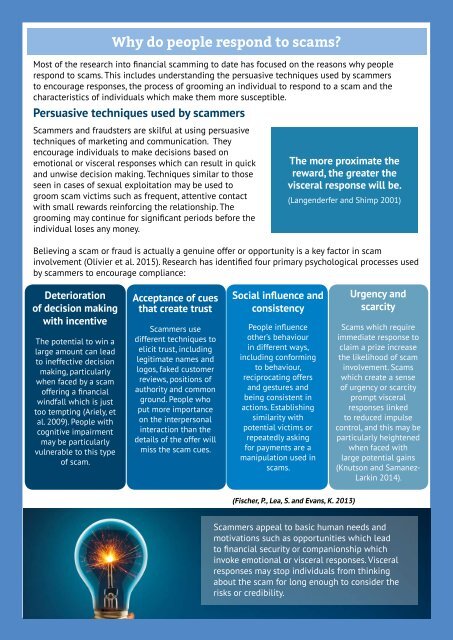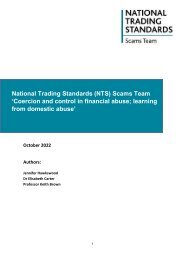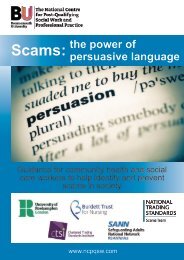Financial Scamming and Fraud
Financial scamming and its impact have been receiving a higher public profile in recent months, yet though it is recognised as a growing problem, there is a lack of clear research and evidence into the scale of the problem, its causes and the impact on the public.
Financial scamming and its impact have been receiving a higher
public profile in recent months, yet though it is recognised as a
growing problem, there is a lack of clear research and evidence
into the scale of the problem, its causes and the impact on the
public.
You also want an ePaper? Increase the reach of your titles
YUMPU automatically turns print PDFs into web optimized ePapers that Google loves.
Why do people respond to scams?<br />
Most of the research into financial scamming to date has focused on the reasons why people<br />
respond to scams. This includes underst<strong>and</strong>ing the persuasive techniques used by scammers<br />
to encourage responses, the process of grooming an individual to respond to a scam <strong>and</strong> the<br />
characteristics of individuals which make them more susceptible.<br />
Persuasive techniques used by scammers<br />
Scammers <strong>and</strong> fraudsters are skilful at using persuasive<br />
techniques of marketing <strong>and</strong> communication. They<br />
encourage individuals to make decisions based on<br />
emotional or visceral responses which can result in quick<br />
<strong>and</strong> unwise decision making. Techniques similar to those<br />
seen in cases of sexual exploitation may be used to<br />
groom scam victims such as frequent, attentive contact<br />
with small rewards reinforcing the relationship. The<br />
grooming may continue for significant periods before the<br />
individual loses any money.<br />
The more proximate the<br />
reward, the greater the<br />
visceral response will be.<br />
(Langenderfer <strong>and</strong> Shimp 2001)<br />
Believing a scam or fraud is actually a genuine offer or opportunity is a key factor in scam<br />
involvement (Olivier et al. 2015). Research has identified four primary psychological processes used<br />
by scammers to encourage compliance:<br />
Deterioration<br />
of decision making<br />
with incentive<br />
The potential to win a<br />
large amount can lead<br />
to ineffective decision<br />
making, particularly<br />
when faced by a scam<br />
offering a financial<br />
windfall which is just<br />
too tempting (Ariely, et<br />
al. 2009). People with<br />
cognitive impairment<br />
may be particularly<br />
vulnerable to this type<br />
of scam.<br />
Acceptance of cues<br />
that create trust<br />
Scammers use<br />
different techniques to<br />
elicit trust, including<br />
legitimate names <strong>and</strong><br />
logos, faked customer<br />
reviews, positions of<br />
authority <strong>and</strong> common<br />
ground. People who<br />
put more importance<br />
on the interpersonal<br />
interaction than the<br />
details of the offer will<br />
miss the scam cues.<br />
Social influence <strong>and</strong><br />
consistency<br />
People influence<br />
other’s behaviour<br />
in different ways,<br />
including conforming<br />
to behaviour,<br />
reciprocating offers<br />
<strong>and</strong> gestures <strong>and</strong><br />
being consistent in<br />
actions. Establishing<br />
similarity with<br />
potential victims or<br />
repeatedly asking<br />
for payments are a<br />
manipulation used in<br />
scams.<br />
Urgency <strong>and</strong><br />
scarcity<br />
Scams which require<br />
immediate response to<br />
claim a prize increase<br />
the likelihood of scam<br />
involvement. Scams<br />
which create a sense<br />
of urgency or scarcity<br />
prompt visceral<br />
responses linked<br />
to reduced impulse<br />
control, <strong>and</strong> this may be<br />
particularly heightened<br />
when faced with<br />
large potential gains<br />
(Knutson <strong>and</strong> Samanez-<br />
Larkin 2014).<br />
(Fischer, P., Lea, S. <strong>and</strong> Evans, K. 2013)<br />
Scammers appeal to basic human needs <strong>and</strong><br />
motivations such as opportunities which lead<br />
to financial security or companionship which<br />
invoke emotional or visceral responses. Visceral<br />
responses may stop individuals from thinking<br />
about the scam for long enough to consider the<br />
risks or credibility.

















